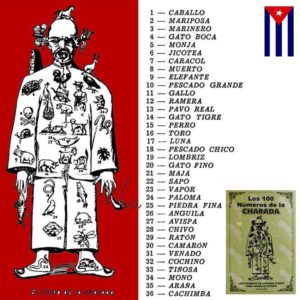As Cubans always fall short or pass, in Cuba they were banned since 1959, with the arrival of the Castro dictatorship, all gambling for money, even declared illegal the National Lottery, those revolutionaries believed that they would end up with everything , and in a certain way they finished everything, except with the “virus” of the games, which is very much inside Cuban. (AV).
Not even in the 90s, in the midst of the worst economic crisis in revolutionary history, was it accepted to open casinos in the keys of the archipelago for the enjoyment of foreign tourists who, at that time, were the only ones who could access.
But the game virus had already penetrated so deep that even today many Cubans fall into the trick of the “badges”, which hides a grain under one of three rum caps that mix at high speed and players bet for guess where it is.
The national ingenuity has no limits, at the present time the most popular game of all is “la bolita”, in which you bet on numbers that come out in lottery draws from other countries, followed by radio or by clandestine satellite TV antennas.
In the field the most widespread is the cockfight, which is legal despite the cruelty it embodies. There are some fences of the State in which it is allowed to fight but without betting and many clandestine ones in which tens of thousands of pesos are played.
Also in the countryside there are horse races and “spiders”, a two-wheeled cart pulled by a horse. For the latter the streets and roads near the towns are used, at the entrance of which the goal is usually.
The most dangerous are the dog fights and the most clandestine car races. The first because there is a lot of violence between the gamblers and in the second a good number of the drivers are “sons of dads” well known.
In practically all sports there are bets, from the World Cup to the national and foreign baseball series. The “bankers” are the ones who direct the procedure but have employees who act as intermediaries.
People say that at a certain moment the bets in the national series handled so much money that they were able to buy some players to rig matches. There is even talk of sanctioned athletes.
The Cuban government’s fight against gambling for money has limited it but it is far from having eliminated it. In the neighborhoods everyone knows who the “boliteros” are and nobody denounces them. In some towns even the police themselves bet.
Undoubtedly, it is easier to issue a decree than to change a custom. The betting virus was already in the veins of many Cubans and the contagion was passed on from generation to generation, without the laws can prevent it.
LOS CUBANOS Y EL “VIRUS” DE LAS APUESTAS A LOS JUEGOS.
Como los cubanos siempre se quedan cortos o se pasan, en Cuba se prohibieron desde 1959, con la llegada de la actual dictadura castrista, todos los juegos de azar por dinero, incluso declararon ilegal la Lotería Nacional, aquellos revolucionarios creyeron que llegarian a acabar con todo, y en cierta forma acabaron con todo, menos con en “virus” de los juegos, que esta calado muy dentro del cubano. (AV).
Ni siquiera en los años 90, en medio de la peor crisis económica de la historia revolucionaria, se aceptó abrir casinos en los cayos del archipiélago para disfrute de los turistas extranjeros que, en esos momentos, eran los únicos que podían acceder.
Pero el virus del juego había ya calado tan hondo que todavía hoy muchos cubanos caen en el truco de las “chapitas”, en el que se esconde un grano bajo una de tres tapas de ron que se mezclan a gran velocidad y los jugadores apuestan para adivinar en cual está.
El ingenio nacional no tiene límites, en la actualidad el juego más popular de todos es “la bolita”, en la que se apuesta a números que salen en sorteos de loterías de otros países, seguidos por radio o por antenas de TV parabólicas clandestinas.
En el campo el más extendido es la riña de gallos, la cual es legal a pesar de la crueldad que encarna. Existen algunas vallas del Estado en las que se permite pelear pero sin apostar y muchas clandestinas en las que se juegan decenas de miles de pesos.
También en el campo se corren carreras de caballos y de “arañas”, un carro de dos ruedas tirado por un caballo. Para estos últimos se utilizan las calles y carreteras cercanas a los pueblos, en la entrada de los cuales está por lo general la meta.
Las más peligrosas son las peleas de perros y las más clandestinas las carreras de automóviles. La primera porque hay mucha violencia entre los apostadores y en la segunda un buen número de los choferes son “hijos de papás” muy conocidos.
Prácticamente en todos los deportes hay apuestas, desde el Mundial de Futbol hasta las series de beisbol nacionales y extranjeras. Los “banqueros” son quienes dirigen el procedimiento pero tienen empleados que funcionan como intermediarios.
La gente cuenta que en determinado momento las apuestas en la serie nacional manejaron tanto dinero que fueron capaces de comprar a algunos peloteros para amañar los partidos. Incluso se habla de deportistas sancionados.
El combate del gobierno cubano contra el juego por dinero lo ha limitado pero está muy lejos de haberlo eliminado. En los barrios todos saben quiénes son los “boliteros” y nadie los denuncia. En algunos pueblos hasta los mismos policías apuestan.
Sin lugar a dudas, resulta más fácil emitir un decreto que cambiar una costumbre. El virus de las apuestas estaba ya en las venas de muchos cubanos y el contagio se trasladó de generación en generación, sin que las leyes puedan evitarlo.
Agencies/OnCUba/Fernando Ravsberg/Excerpts/Internet Photos/ Raquel Perez/ Arnoldo Varona/ TheCubanHistory.com
THE CUBAN HISTORY, HOLLYWOOD.











